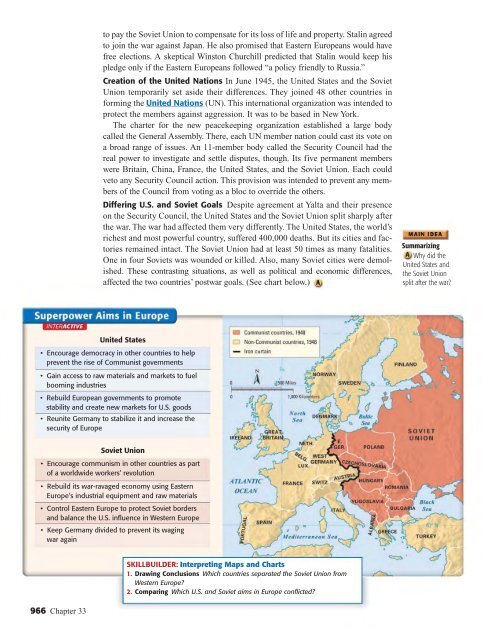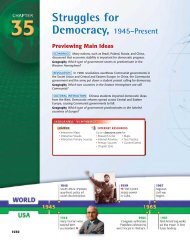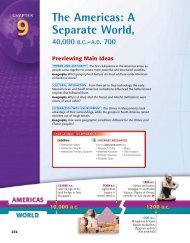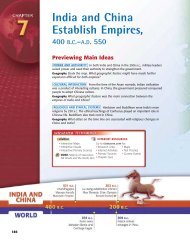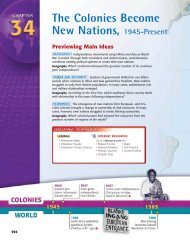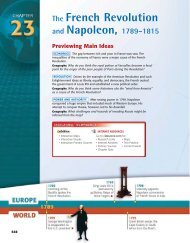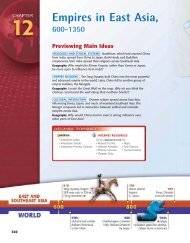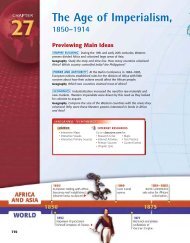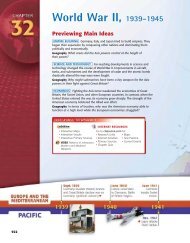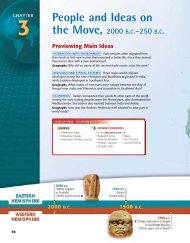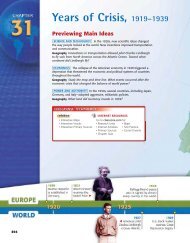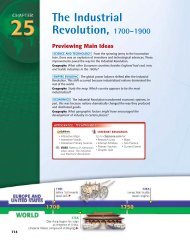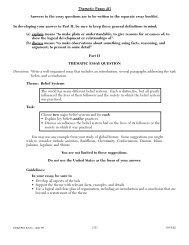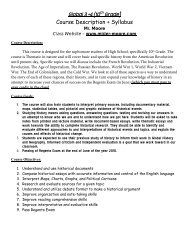Restructuring the Postwar World, - First
Restructuring the Postwar World, - First
Restructuring the Postwar World, - First
Create successful ePaper yourself
Turn your PDF publications into a flip-book with our unique Google optimized e-Paper software.
966 Chapter 33<br />
to pay <strong>the</strong> Soviet Union to compensate for its loss of life and property. Stalin agreed<br />
to join <strong>the</strong> war against Japan. He also promised that Eastern Europeans would have<br />
free elections. A skeptical Winston Churchill predicted that Stalin would keep his<br />
pledge only if <strong>the</strong> Eastern Europeans followed “a policy friendly to Russia.”<br />
Creation of <strong>the</strong> United Nations In June 1945, <strong>the</strong> United States and <strong>the</strong> Soviet<br />
Union temporarily set aside <strong>the</strong>ir differences. They joined 48 o<strong>the</strong>r countries in<br />
forming <strong>the</strong> United Nations (UN). This international organization was intended to<br />
protect <strong>the</strong> members against aggression. It was to be based in New York.<br />
The charter for <strong>the</strong> new peacekeeping organization established a large body<br />
called <strong>the</strong> General Assembly. There, each UN member nation could cast its vote on<br />
a broad range of issues. An 11-member body called <strong>the</strong> Security Council had <strong>the</strong><br />
real power to investigate and settle disputes, though. Its five permanent members<br />
were Britain, China, France, <strong>the</strong> United States, and <strong>the</strong> Soviet Union. Each could<br />
veto any Security Council action. This provision was intended to prevent any members<br />
of <strong>the</strong> Council from voting as a bloc to override <strong>the</strong> o<strong>the</strong>rs.<br />
Differing U.S. and Soviet Goals Despite agreement at Yalta and <strong>the</strong>ir presence<br />
on <strong>the</strong> Security Council, <strong>the</strong> United States and <strong>the</strong> Soviet Union split sharply after<br />
<strong>the</strong> war. The war had affected <strong>the</strong>m very differently. The United States, <strong>the</strong> world’s<br />
richest and most powerful country, suffered 400,000 deaths. But its cities and factories<br />
remained intact. The Soviet Union had at least 50 times as many fatalities.<br />
One in four Soviets was wounded or killed. Also, many Soviet cities were demolished.<br />
These contrasting situations, as well as political and economic differences,<br />
affected <strong>the</strong> two countries’ postwar goals. (See chart below.)<br />
United States<br />
• Encourage democracy in o<strong>the</strong>r countries to help<br />
prevent <strong>the</strong> rise of Communist governments<br />
• Gain access to raw materials and markets to fuel<br />
booming industries<br />
• Rebuild European governments to promote<br />
stability and create new markets for U.S. goods<br />
• Reunite Germany to stabilize it and increase <strong>the</strong><br />
security of Europe<br />
Soviet Union<br />
• Encourage communism in o<strong>the</strong>r countries as part<br />
of a worldwide workers’ revolution<br />
• Rebuild its war-ravaged economy using Eastern<br />
Europe’s industrial equipment and raw materials<br />
• Control Eastern Europe to protect Soviet borders<br />
and balance <strong>the</strong> U.S. influence in Western Europe<br />
• Keep Germany divided to prevent its waging<br />
war again<br />
SKILLBUILDER: Interpreting Maps and Charts<br />
1. Drawing Conclusions Which countries separated <strong>the</strong> Soviet Union from<br />
Western Europe?<br />
2. Comparing Which U.S. and Soviet aims in Europe conflicted?<br />
Summarizing<br />
Why did <strong>the</strong><br />
United States and<br />
<strong>the</strong> Soviet Union<br />
split after <strong>the</strong> war?


